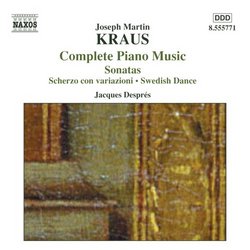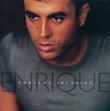| All Artists: Joseph Martin Kraus, Jacques Despres Title: Kraus: Complete Piano Music Members Wishing: 0 Total Copies: 0 Label: Naxos Original Release Date: 1/1/2003 Re-Release Date: 9/23/2003 Genre: Classical Styles: Chamber Music, Historical Periods, Classical (c.1770-1830) Number of Discs: 1 SwapaCD Credits: 1 UPC: 747313577125 |
Search - Joseph Martin Kraus, Jacques Despres :: Kraus: Complete Piano Music
 | Joseph Martin Kraus, Jacques Despres Kraus: Complete Piano Music Genre: Classical
|
Larger Image |
CD DetailsSimilarly Requested CDs
|
CD ReviewsSurprising Piano Music by a Contemporary of Mozart J Scott Morrison | Middlebury VT, USA | 10/02/2003 (5 out of 5 stars) "I had never paid much attention to the music of Joseph Martin Kraus (1756-1792) until Naxos began issuing their series of his orchestral music. Although he is sometimes called 'the Swedish Mozart' and although he has almost precisely the same dates as Mozart, his music is actually more like that of middle-period Haydn in general. On this disc though, which contains all of his piano music, the style reminds me much more of that of Carl Philipp Emanuel Bach, although the early pieces sound more like the much older composer, Baldassarre Galuppi--I'm referring especially to the Rondo in F major, VB 191; think of that delightful Galuppi C major sonata that Michelangeli was so fond of and which he recorded several times. There is some similarity, too, to the Mannheim School, although in my opinion he is more talented than, say, Stamitz. This is music that tends towards that sensibility associated with C. Ph. E. Bach, the so-called 'Emfindsamkeit' [roughly 'feeling-ness'] movement.At any rate, this disc is a bit of a surprise. For one thing one hears surprising turns of phrase, odd (but pleasing) modulations, and unexpected and unprepared-for changes of mood. At first listen, especially if one isn't paying close attention, this sounds like typical style galant music-box prettiness. But when you really hear what he's doing the surprises mount. There is always tunefulness and grace but they are often associated with unexpected asymmetry of phrase-length. This grows as Kraus reaches his maturity and in the second sonata in particular (VB 196) there is even some foreshadowing of early Beethoven in that there is broader statement of themes, a grandiosity even, and more complex manipulation of thematic, rhythmic and harmonic material. (I'm thinking particularly of the second theme of the first movement which is downright Beethovian.) This sonata's last (third) movement is an engaging (but sometimes moodily intense) set of variations. Which brings me to my favorite piece here: the Scherzo con variazioni, VB 193, a 12-minute set of variations on a particularly trivial theme (but think what Beethoven did with Diabelli's trinket!) that opens with hunting horn harmonies but progresses further and further down a path of harmonic complexity. Indeed one of the variations modulates crazily and rapidly through (by my count) six barely related minor keys; that's pretty wild for 1785; he was living in London at the time, so maybe it was due to all the gin that flowed freely in those days. The only regret I have about this disc--and I'm speaking wistfully here--is that the so-called Larghetto, VB 194, lasts only 42 seconds. It's clearly a theme for a set of variations, and a potentially fecund one--it's a sort of chorale whose bass-line would have made a bang-up passacaglia--that for whatever reason Kraus apparently never got around to writing. Our loss. The pianist here, Jacques Després, is new to me and I cannot praise his playing too highly. This is seemingly simple music but, like in that of Mozart, lapses of taste and style in its playing are transparently obvious; there are no such solecisms in Monsieur Després' playing. He is a Québécois currently living and teaching at the University of Alberta in Edmonton, where the disc was recorded. I want to specially mention that the piano used, a Hamburg Steinway, has an extraordinarily rich and lustrous sound and it is beautifully recorded by engineer Garth Hobden. A pity Kraus didn't write more piano music. Recommended.TT=79:17Scott Morrison"
|

 Track Listings (11) - Disc #1
Track Listings (11) - Disc #1








